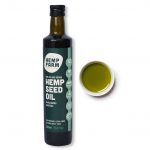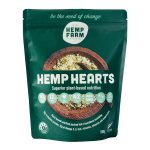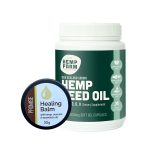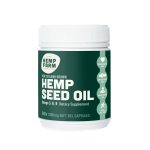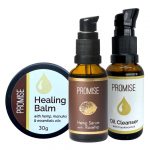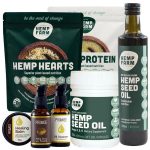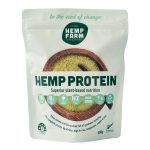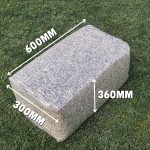
Hemp Plantings On High Following Law Change
If you see a cannabis crop in a paddock this summer, it is most likely to be legal and a waste of time smoking.
Commercial plantings of industrial hemp, the legal and non-high inducing form of cannabis, could reach up to 1000 hectares this season after law changes that enable hemp seed to be treated as just another edible seed.
The hemp industry has two major players, Ashburton-based Midlands Seed which produces various seed products, and North Island-based HempFarm NZ owned by Dave and Anne Jordan, a 100 per cent hemp-based company, focusing on whole plant usage.
HempFarm NZ chief executive Dave Jordan said it had contracted through its growers group about 500 hectares of hemp crops in Waikato, Hawke’s Bay, Wairarapa, Manawatu and Canterbury this season. Its growers include Pamu Farms (formerly Landcorp Farming).
HempFarm’s planting area was expected to expand to 2000ha next year and 10,000ha within five to eight years. “We see a massive future for the whole plant, not just the seed,” Jordan said.
Midlands Seed director Andrew Davidson said he was delighted the law had changed, but the timing was too late for this season. Though declining to quote figures, he said Midlands had increased contracted plantings for this season in anticipation of the law change and was likely to further expand these production areas next season.
“We confirm our spring contract areas in July and then apply for growing licences (from the Ministry of Health) which take a minimum of 30 days.”
Hemp crops could return $4000 a hectare, with a 120-day plant cycle and relatively low input costs, said Davidson. “If we want to continue to increase the production area it’s got to be a competitive cropping option in terms of pricing and grower returns.”
Midlands had been contracting farmers to grow hemp for seed since 2001, when legal restrictions were first lifted. Until now, only hemp seed oil could be sold as a food in New Zealand, relegating the co-product hemp seed meal, 75 per cent of the whole seed, for sale as an animal food. “So we are going from being able to sell 25 per cent of the raw material for human consumption to 100 per cent.”
Hemp grown in a paddock looks identical to its illegal cousin, the recreational drug marijuana, but without the THC euphoric-high effects. Hemp has virtually zero THC, less than 0.35 per cent. Midlands and its growers treat it like any commercial arable crop, with some extra precautions, such as not planting crops where they can be seen from the road, to avoid unwanted attention.
“We didn’t want to get into the situation where we were getting ahead of ourselves in terms of matching production to sales, so we took a conservative approach. In 12 months we will have a much better idea of the size of the New Zealand market,” Davidson said.
As well as selling hemp seed foods and oil under its retail brand New Hemisphere, Midlands also supplied other businesses, both domestically and overseas.
“We have seen a steady increase in demand in the last six months. People started doing research and development so they had food products ready to go. New Zealand is a leader in innovation so I am sure we will see some unique and novel food ingredients come into the market.”
Hemp seed oil was one of nature’s richest sources of essential fatty acids, including omega 6 and omega 3 and hemp protein powder and hulled hemp seeds were popular with bodybuilders because of their high protein levels.
Midlands would concentrate its planting in Mid and South Canterbury.
“It needs to be broadacre and well supported by good infrastructure. It needs water at crucial times. It is also susceptible to birds, so small areas aren’t economically feasible because of the bird pressure. They love it,” Davidson said.
“Hemp enthusiasts often only focus on the opportunities and benefits of the product, but the reality of agriculture is that you have to compete globally and we have to find our niche.”
Australia, North America, China and Europe were big hemp growers, so New Zealand had to position its hemp products at a premium level to maximise export returns, Davidson said.
Jordan said HempFarm NZ was developing specialised harvesters and processing equipment for cultivating and utilising the whole plant for fibre and seed. HempFarm had two harvesters developed to cater for the taller crops between 3.5m to 4m grown for fibre and food. “The harvesters are imported and we have engineered the front to suit the tall crop. While hemp is an easy crop to grow, it is challenging to harvest, as its rope-like fibre is prone to wrapping around and damaging the most robust machinery.
“In the future, as supply of seed grows, some crops will be harvested earlier as fibre-only crops”.
HempFarm was building fibre processing facilities in both the North and South Islands. “This will produce processed fibre which can be used in various applications such as carpets, insulation, eco-matting, composite materials and more.
“Alongside fibre production we now have a new 4000 sq m food grade facility capable of producing hemp foods such as de-shelled seed, protein powder, butters, milk and more. HempFarm has been importing certified organic Canadian hemp seed oil to raise awareness about the great health benefits of the plant. We are also able to supply bulk supply to various food manufacturers.
“The initial emphasis is on developing the New Zealand market. But our future is marketing New Zealand organic hemp to the world,” Jordan said.
Brad Lake, the maker of hemp-based protein bar Beefy Green said it was in the final stages of development and expected to be on Foodstuffs supermarket shelves by January or February. Lake, a rural banker, and his business partner pharmacist Brendon McIntosh were using an $85,000 prize package in a competition for startups to scale-up manufacturing. They were already retailing hemp oil and protein powder.
“I went to Canada and the United States in August and they are well ahead in terms of value-added hemp products like hemp milk, breakfast cereal, cosmetics and oil. Anything you can think of,” Lake said.
New Zealand Hemp Industries Association vice-chairman Richard Barge said hemp flowers and leaves remained illegal. “This continued restriction is frustrating for those who want the high value nutrition of the whole plant to be made available to New Zealanders for dietary and medical benefits.”


